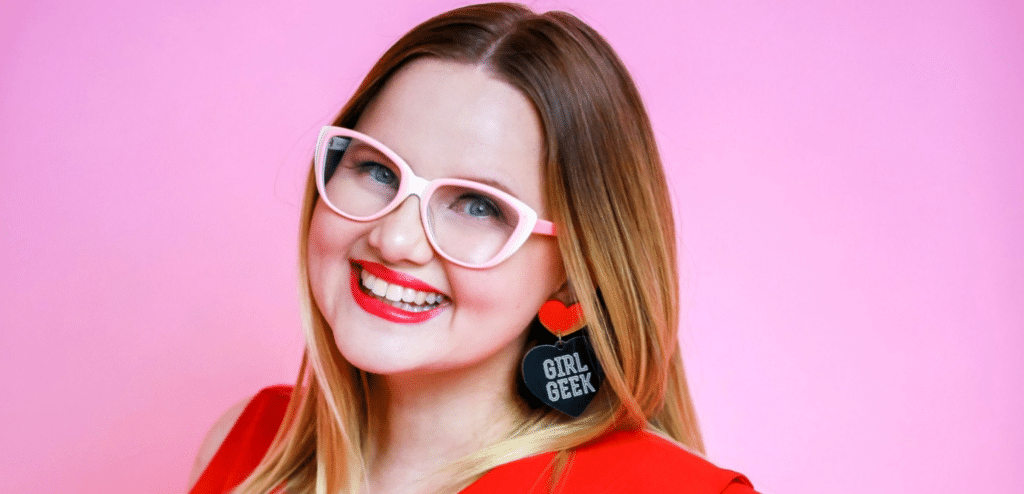Sarah Moran is the founder of Girl Geek Academy. But the incredible initiative for getting more women and girls into coding is running out of money.
She says Girl Geek Academy, along with other key initiatives engaging women and girls in STEM, can no longer survive the current freeze on such community programs, and she’s calling on the Albanese Government to make immediate funding commitments to support solutions aimed at ending inequality in STEM.
Her campaign has been featured across a wide range of media this week, from The Australian to the Women’s Weekly Magazine and more.
Her call comes as this week’s International Women’s Day theme was all about innovation and “cracking the code”, and as events and initiatives and politicians spoke up about the need to get more women into STEM.
Below, Sarah shares more on the campaign and what’s going on.
There is a single damning truth about individual stereotypes that have dominated the Australian IT industry and the reason why the number of women coders in Australia is going backwards, from 35 percent in the ‘90s to 25 percent today: meritocracy is a myth.
The world needs women to be digital innovators to drive a gender-equal future. But first, we need to stop short-changing women.
Last week, Minister for Industry and Science, Ed Husic launched the consultation period for the government’s Diversity in STEM Review which it says will provide “the evidence, insight and recommendations” needed for lifting participation of women in Science, Technology, Engineering, and Maths industries. This is a further setback for cohorts of girls already participating in STEM. The government needs to put its money where its mouth is.
We need action, not just another review or consultation.
Girl Geek Academy was founded with the vision of bringing one million women and girls into technology careers by 2030 through a range of programs in industries such as games, startups, 3D printing, design, and aviation. We have everything from games to career incubators aimed at developing the industry with specific programs for helping girls succeed. We launched Girl Geek Academy because my co-founders and I wanted to break the chains of gendered stereotypes and attitudes towards the IT sector that have been terribly damaging to girls and young women.
It
hurts to see our industry, full of promise and potential, continue to stagnate due to a lack of diversity and inclusion. Innovation doesn’t happen through this sameness. Neither does gender equality.
I first learned to code when I was five years old. At first, all I did was code games that my friends could play. But in Grade 5, Google came to visit our school introducing us to the world of the internet and the idea of mass global information sharing. I was the first girl computer programmer at my high school to enter a competition and I kept fighting until I was the last woman standing. I used to tell my friends I was going to “choir practice” when I was actually going to the computer room to practice coding because being a girl geek was not a way to succeed socially in a country town high school. For every moment of encouragement or success in my career journey, there have been equally difficult encounters that contributed to self-doubt.
I have been fired from a startup for being “too aggressive”. I have been left out of a tech start-up’s team offsite where the entirely male management team went for a golf day. And yet, I have not stopped. My story is not a unique one and as a co-founder of Girl Geek Academy, our vision was to build the community infrastructure we need to support women innovators.
It’s no secret that Australia has a gender problem. According to the CEW Senior Executive Census 2022, there were just 18 women CEOs in the ASX300 last year, which shows no improvement from 2021.
In fact, a total of 46 companies in the ASX300 had no women in their executive leadership team, up from 44 in 2021. Women-led start-ups received only 3 percent of global venture capital investment. In Australia, that figure dropped to 0.7 percent in 2021. Australia has made no progress in tackling gender inequality and the strength of our tech sector has suffered as a result.
We started all-women hackathons as an important way to address some of the issues around gender inequality and a growing Red Bull-fuelled Tech Bro culture that was in dire need of change. All around us, women were not being heard and empty promises kept being made. You can’t simplify this growing chasm of inequality into a list of ‘top three challenges’ faced by women in tech today because that’s the wrong way to look at the problem. Our industry is plagued by structural issues that are keeping women out. It’s our job to engage them.
What I wanted to start was a movement. By teaching coding to girls and mums at ‘She Hacks’, I wanted to break conventional stereotypes and make rooms of women and girls coding together a norm for the generations to come.
We have now been doing this for 10 years. Let’s solve this problem so that I can go back to being a woman working in technology instead of stepping out of my career to try and save more women and girls from falling away.
So if you want to see the government commit to an urgent, “Cracking the Code” fund, I urge you to call Minister Ed HUsic’s office now on 02 6277 7070. I know it can seem intimidating, but it only takes five minutes to share your concerns and help make a difference.


